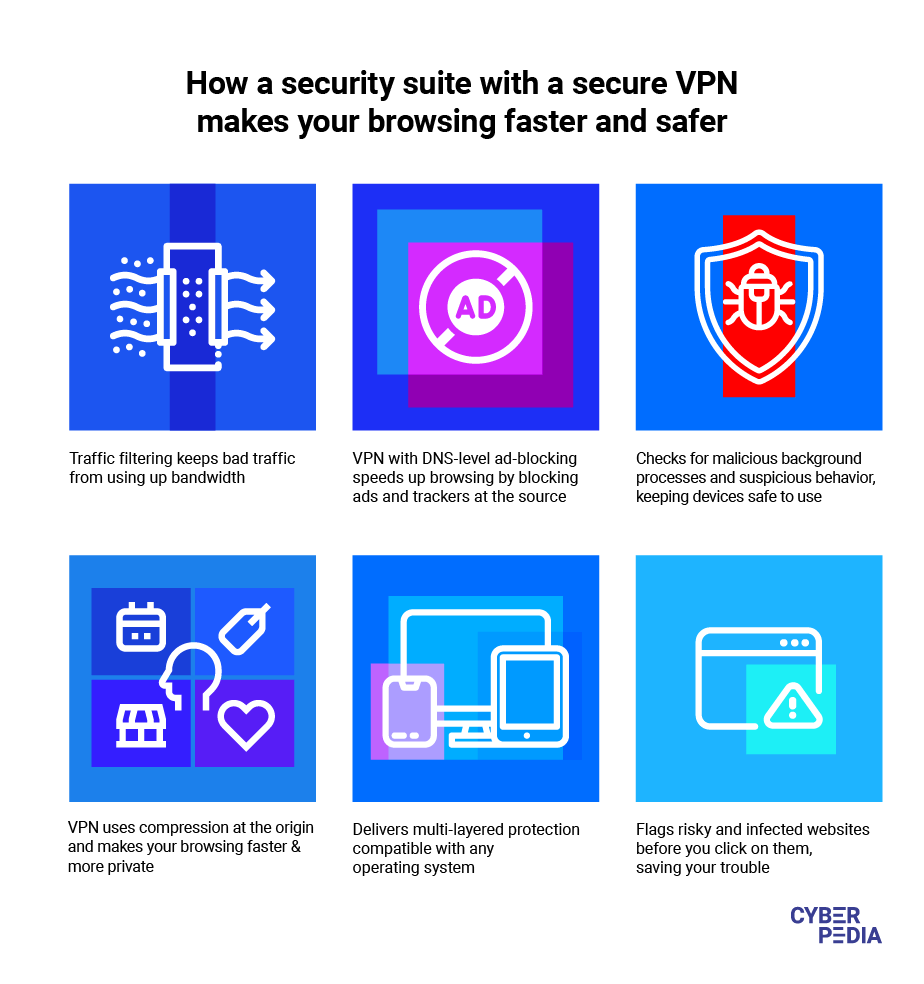7 Tips for Safe Web Browsing

Struggling with low Internet speeds? Digital security and privacy can play a considerable role in improving them. After all, online everything is interconnected.
Your connection speed depends on more than just your internet plan, device specs, or whether you're using a wired, wireless, or mobile network.
Find out why a faster Internet isn’t just about quicker page loads - although that is the most noticeable effect. Our cybersecurity experts share tips on how to optimize your setup for faster, safer browsing with minimal effort.
What Defines a Fast and Secure Browsing Experience
A fast and secure browsing experience is typically uneventful, which is exactly the goal you should aim for - just ask any cybersecurity expert.
Consider the computer, phone, or tablet you are using to access the Internet. When everything is secure, you may notice that your device:
- Works seamlessly, allowing you to continue what you're doing without any interruptions.
- Follows your commands without pushing unwanted information or prompting you to take actions you did not intend.
- Notifies you when it automatically installs updates, including security enhancements.
- Warns you of potential risks while browsing, keeping you informed if anything unusual occurs.
- Provides clear information on the threats it blocks and explains the reasons behind each action.
- Operates smoothly, without any significant problems affecting your digital identity or financial security.
At its core, a fast and secure browsing experience is seamless, giving you full visibility and control over your digital footprint. But how do you achieve it?
"There is a common misconception that complexity stands in the way of good security.
The truth is there are tools and habits that help alleviate complexity so you can have a secure online experience. All you have to do is take a bit of time to find them and make them part of your setup."
Bogdan Botezatu (Director of Threat Research and Reporting, Bitdefender)
1. Perform a Deep Clean and Regain Control of Your Devices
More often than you think, digital clutter is what is slowing down your browsing. Our online activities produce a large amount of data, but this is not always visible to us.
Begin by assessing all your devices and apps:
- How many connected devices do you own? Maybe you have more than you thought.
- Which ones do you use the most frequently? You might not even realize that some devices are connected to the Internet, consuming bandwidth and increasing your vulnerability to cyberattacks.
- Which devices do you share with others? Shared devices are often more susceptible to cybersecurity risks.
- Which apps do you truly use? It is important to remove unused apps, as they often run background processes that drain your battery and consume Internet bandwidth.
And now that your devices and apps are in order, it is a good time to back up your important data.
2. Optimize Your Home Network
Clearing out unused devices and data-hungry apps is the first step toward a smoother, faster Internet connection. The second step is giving your home Wi-Fi some much-needed attention.
Then run a Wi-Fi speed test. If the results are still slow, it is time to inspect your hardware.
Keep in mind that bandwidth is not the only factor behind slow connections. Often, the issue lies in not having optimized your Wi-Fi network. Like decluttering, this process involves addressing both the hardware and software you rely on.
Better Hardware, Better Internet Connectivity
One essential step is resetting your wireless router. It may seem simple, but the classic "have you tried turning it off and on again?" approach is surprisingly effective and still proves helpful.
If you still do not see the desired results, it is worth checking for factors that may be weakening your Wi-Fi signal. Walls and interference from your neighbors' devices can cause slower Internet speeds.
If you tried everything within your control and are still unhappy with your Internet connection, it may be time to escalate the issue. Contact your provider to inspect their modem, as outdated equipment may no longer meet your current needs.
Software Tweaks for a Better Browsing Experience
In addition to ensuring the physical components are functioning properly, it is important to review your router settings and make sure that your network is password protected.
Is is also a good idea to rename your home network and either add a password or strengthen the one you already have. (A good password manager can be really helpful here!)
Moreover, opt for WPA2 or WPA3 (rather than WEP) for your wireless security protocol. This ensures protected access for every device to your router and keeps you safe from automated attacks that target exposed network equipment.
If it is not already enabled, consider turning on the firewall built into your router. This feature helps filter out malicious traffic that could potentially compromise your devices.
These small adjustments should lead to a faster and more stable Internet connection. And if that is still not enough, there are additional steps you can take!

3. Keeping Your Devices Updated is a Game-Changer
Regularly updating your operating system is one of the best ways to enhance your security. Additionally, updates bring stability and performance improvements, contributing to a smoother browsing experience.
Whenever possible, enable automatic updates that are installed silently, requiring no effort from you. When considering updates, apply them to all your devices, including operating systems, apps, and especially your web browsers.
4. Malware Scans Can Supercharge Your Devices' Speed
Overloaded and neglected devices are prime targets for data-hungry malware. A slow Internet connection can be a sign that malware (like cryptominers) is secretly exploiting your device's resources and home network to mine cryptocurrencies.
Other types of threats can also impact your browsing experience. Malware that slows down Internet speed includes:
- Adware that repeatedly bombards you with ads, pushing you to buy unwanted products and services
- Spyware that collects information about your activity, accesses your files, steals login credentials, banking details, and credit card information, all while tracking your every move
- Rootkits that grant attackers administrator-level access to your system, allowing them to control your device and network, and perform nearly any action they choose.
Various other types of cyber-threats can affect your connection speed and browsing experience. These threats are designed to delete, modify, rename, and transfer files, open and close programs at will, and interfere with your operating system. Some are even programmed to seek out other devices on your home network and infect them too.
"Even if you’re not storing important information on your device or using it to make online transactions, an unprotected computer can still be used by cybercriminals in massive botnets that deal devastating blows to internet infrastructure.
They can use it to knock countries offline, host illegal content, and as a proxy to disguise their criminal activity. That leaves you exposed to an international investigation, with law enforcement knocking on your door because there’s been some illegal activity originating from your device – and you have no idea where it came from."
Bogdan Botezatu (Director of Threat Research and Reporting, Bitdefender)
Here’s how cybersecurity software can improve your browsing experience (while keeping your devices safe):
- It filters Internet traffic, preventing malicious traffic from consuming bandwidth
- If it includes a VPN, it uses a custom DNS server or advanced blocking technology to keep your browsing ad-free and faster
- It monitors for malicious background processes and suspicious activity, blocking and containing threats before they can infect your device or spread to others on your network
- It provides continuous protection for all your connected devices, such as laptops, smartphones, and tablets.
5. Optimize Your Web Browser to Boost Security and Speed
Your web browser is your primary gateway to the Internet, so it becomes a prime target for cyber-criminals and scammers.
Here are three actions you can take right now for a more secure web browsing experience:
- Clear your browser cache, cookies, and browsing history for an instant boost in performance
- Remove add-ons and only keep the ones you really need, as these browser extensions can become vectors for malware delivery
- Transfer your passwords from your browser to a password manager, which protects them from malware that could steal them in seconds.
For enhanced browser protection you can also try the free Bitdefender Traffic Light extension that works with Chrome, Firefox, and Safari. It packs an advanced malware filter, protection against phishing attacks, and trackers identifier. It also works as a link scanner, making sure links are safe before you click them.
6. Use a VPN for Ad-Blocking and Secure, Encrypted Connections
Using a secure VPN can actually boost your Internet connection speed.
It achieves this through DNS-level ad-blocking, which not only makes your browsing faster but also enhances privacy and security simultaneously.
Second, the encrypted connection helps you hide your IP address and remove Internet throttling by your ISP, which may slow down your connection.
By rerouting your data through an encrypted tunnel, a virtual private network (VPN) provides enhanced protection against tracking and certain cyberattacks, giving you multiple benefits at once.
Finally, a VPN uses compression at the origin, reducing data traffic and resulting in a faster Internet connection.
7. Keep Being Expensive to Target
The most effective digital security strategy is to make yourself as challenging as possible for hackers to breach.
"The presence of a security solution alone makes it prohibitively expensive for cyber-criminals to target somebody. If it weren’t for a security solution, a system would most likely get infected within five minutes of being connected to the Internet.
The fact that it happens so rarely for people who are running cybersecurity solutions proves that they are effective at what they are doing in the background."
Bogdan Botezatu (Director of Threat Research and Reporting, Bitdefender)
Nowadays, anyone concerned about their digital security has a wide range of tools available. Over the years, security and privacy products have become more user-friendly and affordable.
By maintaining a consistent routine of small improvements, not only will it become more cost-effective to safeguard your digital footprint, financial assets, and other online aspects of your life, but it will also make it easier to build good habits.
tags
Author
Choose what the experts use. Award-winning cybersecurity you can trust and rely on.
View all posts
